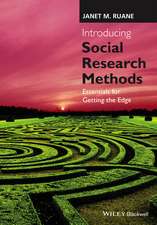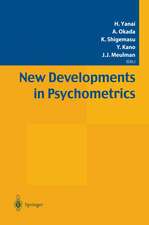Models of Science Dynamics: Encounters Between Complexity Theory and Information Sciences: Understanding Complex Systems
Editat de Andrea Scharnhorst, Katy Börner, Peter van den Besselaaren Limba Engleză Paperback – 22 feb 2014
| Toate formatele și edițiile | Preț | Express |
|---|---|---|
| Paperback (1) | 640.06 lei 6-8 săpt. | |
| Springer Berlin, Heidelberg – 22 feb 2014 | 640.06 lei 6-8 săpt. | |
| Hardback (1) | 646.75 lei 6-8 săpt. | |
| Springer Berlin, Heidelberg – 23 ian 2012 | 646.75 lei 6-8 săpt. |
Din seria Understanding Complex Systems
- 18%
 Preț: 1112.30 lei
Preț: 1112.30 lei -
 Preț: 439.25 lei
Preț: 439.25 lei - 18%
 Preț: 1119.38 lei
Preț: 1119.38 lei - 15%
 Preț: 401.82 lei
Preț: 401.82 lei - 18%
 Preț: 1247.26 lei
Preț: 1247.26 lei - 15%
 Preț: 641.20 lei
Preț: 641.20 lei - 15%
 Preț: 642.68 lei
Preț: 642.68 lei - 15%
 Preț: 651.51 lei
Preț: 651.51 lei - 18%
 Preț: 946.55 lei
Preț: 946.55 lei - 18%
 Preț: 947.98 lei
Preț: 947.98 lei - 20%
 Preț: 650.27 lei
Preț: 650.27 lei - 18%
 Preț: 952.09 lei
Preț: 952.09 lei - 18%
 Preț: 957.13 lei
Preț: 957.13 lei - 18%
 Preț: 943.88 lei
Preț: 943.88 lei -
 Preț: 398.35 lei
Preț: 398.35 lei - 5%
 Preț: 1417.54 lei
Preț: 1417.54 lei - 15%
 Preț: 648.42 lei
Preț: 648.42 lei -
 Preț: 387.75 lei
Preț: 387.75 lei - 18%
 Preț: 1133.76 lei
Preț: 1133.76 lei - 18%
 Preț: 948.16 lei
Preț: 948.16 lei - 20%
 Preț: 655.85 lei
Preț: 655.85 lei - 18%
 Preț: 1113.09 lei
Preț: 1113.09 lei - 20%
 Preț: 655.53 lei
Preț: 655.53 lei - 15%
 Preț: 653.00 lei
Preț: 653.00 lei - 18%
 Preț: 1332.92 lei
Preț: 1332.92 lei - 18%
 Preț: 1010.48 lei
Preț: 1010.48 lei - 18%
 Preț: 955.56 lei
Preț: 955.56 lei -
 Preț: 384.22 lei
Preț: 384.22 lei - 18%
 Preț: 950.66 lei
Preț: 950.66 lei - 15%
 Preț: 638.43 lei
Preț: 638.43 lei - 15%
 Preț: 644.49 lei
Preț: 644.49 lei - 15%
 Preț: 647.40 lei
Preț: 647.40 lei - 15%
 Preț: 649.06 lei
Preț: 649.06 lei - 15%
 Preț: 639.25 lei
Preț: 639.25 lei - 15%
 Preț: 643.65 lei
Preț: 643.65 lei - 18%
 Preț: 960.78 lei
Preț: 960.78 lei - 15%
 Preț: 649.87 lei
Preț: 649.87 lei - 15%
 Preț: 645.47 lei
Preț: 645.47 lei
Preț: 640.06 lei
Preț vechi: 753.01 lei
-15% Nou
Puncte Express: 960
Preț estimativ în valută:
122.47€ • 127.87$ • 101.36£
122.47€ • 127.87$ • 101.36£
Carte tipărită la comandă
Livrare economică 05-19 aprilie
Preluare comenzi: 021 569.72.76
Specificații
ISBN-13: 9783642448843
ISBN-10: 3642448844
Pagini: 300
Ilustrații: XXX, 270 p.
Dimensiuni: 155 x 235 x 16 mm
Greutate: 0.41 kg
Ediția:2012
Editura: Springer Berlin, Heidelberg
Colecția Springer
Seria Understanding Complex Systems
Locul publicării:Berlin, Heidelberg, Germany
ISBN-10: 3642448844
Pagini: 300
Ilustrații: XXX, 270 p.
Dimensiuni: 155 x 235 x 16 mm
Greutate: 0.41 kg
Ediția:2012
Editura: Springer Berlin, Heidelberg
Colecția Springer
Seria Understanding Complex Systems
Locul publicării:Berlin, Heidelberg, Germany
Public țintă
ResearchCuprins
Part I Foundations.- An Introduction to Modeling Science: Basic Model Types, Key Definitions, and a General Framework for the Comparison of Process Models.- Mathematical Approaches to Modeling Science From an Algorithmic-historiography Perspectice.- Part II Exemplary Model Type.- Knowledge Epidemics and Population Dynamics Models for Describing Idea Diffusion.- Agent-based Models of Science.- Evolutionary Game Theory and Complex Networks of Scientific Information.- Part III Exemplary Model Applications.- Dynamic Scientific Co-authorship Networks.- Citation Networks.- Part IV Outlook.- Science Policy and the Challenges for Modeling Science.- Index.
Recenzii
From the reviews:
“The book is a comprehensive review of the mathematical models of science from its origins. … each chapter has ‘checkpoints’, i.e., a box or a table presenting either a list of relevant questions together with short answers or a summary of the key-points discussed. This particular structure makes the book especially suited for graduate students and scholars … . experts will surely appreciate the richness and depth of the cited literature, for the first time so well organized into a single book.” (Stefano Balietti, Journal of Artificial Societies and Social Simulation, Vol. 15 (3), 2012)
“The book is a comprehensive review of the mathematical models of science from its origins. … each chapter has ‘checkpoints’, i.e., a box or a table presenting either a list of relevant questions together with short answers or a summary of the key-points discussed. This particular structure makes the book especially suited for graduate students and scholars … . experts will surely appreciate the richness and depth of the cited literature, for the first time so well organized into a single book.” (Stefano Balietti, Journal of Artificial Societies and Social Simulation, Vol. 15 (3), 2012)
Textul de pe ultima copertă
Models of science dynamics aim to capture the structure and evolution of science. They are developed in an emerging research area in which scholars, scientific institutions and scientific communications become themselves basic objects of research. In order to understand phenomena as diverse as the structure of evolving co-authorship networks or citation diffusion patterns, different models have been developed. They include conceptual models based on historical and ethnographic observations, mathematical descriptions of measurable phenomena, and computational algorithms. Despite its evident importance, the mathematical modeling of science still lacks a unifying framework and a comprehensive research agenda.
This book aims to fill this gap, reviewing and describing major threads in the mathematical modeling of science dynamics for a wider academic and professional audience. The model classes presented here cover stochastic and statistical models, game-theoretic approaches, agent-based simulations, population-dynamics models, and complex network models. The book starts with a foundational chapter that defines and operationalizes terminology used in the study of science, and a review chapter that discusses the history of mathematical approaches to modeling science from an algorithmic-historiography perspective. It concludes with a survey of future challenges for science modeling and discusses their relevance for science policy and science policy studies.
This book aims to fill this gap, reviewing and describing major threads in the mathematical modeling of science dynamics for a wider academic and professional audience. The model classes presented here cover stochastic and statistical models, game-theoretic approaches, agent-based simulations, population-dynamics models, and complex network models. The book starts with a foundational chapter that defines and operationalizes terminology used in the study of science, and a review chapter that discusses the history of mathematical approaches to modeling science from an algorithmic-historiography perspective. It concludes with a survey of future challenges for science modeling and discusses their relevance for science policy and science policy studies.
Caracteristici
Edited and Authored by leading researchers in the field First interdisciplinary treatment of this topic and the interface of information and systems sciences, scientometrics and social complex networks Addresses a wider academic and professional audience Includes supplementary material: sn.pub/extras























